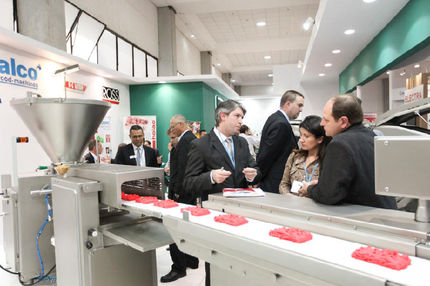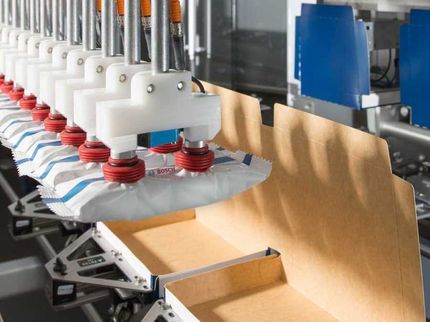ProSweets Cologne 2020: Packaging for sweets and snacks
Sustainability and digitization are the innovation drivers for success at the point of sale
Advertisement
What requirements will packaging for confectionery and snacks have to meet in 2020 and beyond? ProSweets Cologne, which will take place from 2 to 5 February 2020, will provide answers to this question. Less plastic, more renewable raw materials, lower packaging weight and recyclability are the focus of the solutions shown in Cologne. Product information is also gaining in importance at the international supplier trade fair for the confectionery and snack industry as a result of digitization, which is playing an increasingly important role at the point of sale.

Image by S. Hermann & F. Richter from Pixabay
Snacks and confectionery are classic on-the-go products: They are bought spontaneously and often eaten on the way. The convenience of the packaging plays a decisive role here. But that alone is no longer enough: almost 70 percent of consumers in Germany have already given up buying a product at least once because the packaging was not sustainable enough for them. For this reason, one in five Germans (19.3 percent) even regularly puts their products back on the shelves. This is the conclusion of a representative survey published by the German Packaging Institute in June 2019. Some retail chains are also involved in this issue and have issued requirements on recyclability.
Confectionery and snack manufacturers who want to be one step ahead of their competitors have recognized that the sustainability of packaging is increasingly decisive for success at the point of sale. Above all, the brand manufacturers consistently pursue a goal that is reflected in many innovations at ProSweets Cologne: As little packaging as possible, as much as necessary! Plastics that are difficult to recycle are gradually removed from the range. At the same time, alternative packaging materials such as compostable paper-based and biodegradable materials are increasingly being used.
Paper that can be formed without adhesives In
order to meet the ever-increasing demands on the sustainability of packaging, the possible uses of paper are constantly being developed further. Among the latest innovations are moulds made of 100 percent recyclable lightweight paper that replace plastic blisters. They are folded in different variants by a rotating erecting machine of the latest generation.
The principle: A tray blank made of ultra-light corrugated board is removed from the blank magazine, pressed through the tool plate and taken out of the machine as a finished package. Since the moulds can be formed completely without adhesives simply by hooking them together, the consumer can dispose of them easily via the waste paper. From here they go directly to paper preparation and are returned to circulation as recycled paper. What appears at first glance to be Japanese paper folding art is the result of close cooperation with plant engineering and packaging material specialists.
New materials for genuine recycled products
However, it is not only packaging made of FSC-certified paper that is becoming a "genuine" recycled product at the Cologne Exhibition Centre. The exhibitors at ProSweets Cologne will be presenting fully recyclable or biodegradable films in Hall 10.1. The innovative materials often have the same mechanical properties as conventional PET/PE composite films and can be processed directly into single and multipacks on tubular bag machines.
Whether paper in the lid or in the bottom film, in tubular bags or portion packs, full-surface, laminated strips or with viewing windows that are individually designed and cut by laser - the segment of sustainable composite materials is growing as is the variety of equipment variants. A wide range of paper-based film solutions is now also available for the economical twist wrapping of chocolate, hard or soft sweets and chewing gums. This is where materials made from renewable raw materials show their strengths, because they reduce the proportion of plastic in the composite material.
"The industry is pursuing a number of approaches to sustainable packaging design and production," says Micha Goes, commenting on developments in the market. He assumes that the variety of materials will increase and that recycling technology will be further improved. At ProSweets Cologne, the managing director of the design agency Pacoon wants to motivate confectionery manufacturers to make a stronger commitment to more sustainable packaging solutions - with a focus on the Refuse, Renew, Remove and Recycle approaches. As part of the PACKAGING "Function meets Design" special show, he and his team present concepts for the future.
On the way to becoming digital multi-talent
brands, which clearly present themselves on sustainable packaging, fall into the current consumer preference for minimalism and clean label. This gives manufacturers an enormous reach at the point of sale, but "often not all the information demanded by consumers can be placed on the packaging," says Alexander Schenk, Chief Design Director at the DeTeMa agency. This is where the digitalisation of packaging comes in, another topic that is the focus of the special show at ProSweets Cologne under the motto "Extended Packaging". Alexander Schenk: "Interactive technologies based on digital codes such as Digimarc have the potential to expand packaging into multi-talents."
What's special about the Digimarc code: It is invisible to the human eye and is applied to the entire packaging - a kind of watermark that not only encrypts the Global Trade Item Number or speeds up the checkout process. It can also be linked to social media. Real and digital worlds merge at the point of sale, simply by pointing the smartphone's camera at any point on the packaging. Recipe, nutritional value or allergen references are just as callable, as offers, sweepstakes or coupons.
Best practice solutions for every trend
How can snack and confectionery products meet the diverse requirements of packaging? What do they need to consider when providing additional product information? From 2 to 5 February 2020, ProSweets Cologne will be presenting the entire range of suppliers to the confectionery and snack industry: from a wide variety of ingredients to innovative packaging machines and materials to optimised production technologies that meet the highest demands in terms of quality and cost-effectiveness. Central industry topics will also be discussed at the Speakers Corner, the central lecture stage at ProSweets Cologne. In addition, the ISM Packaging Award powered by ProSweets Cologne will again be presented for the most innovative packaging. The B2B trade fair takes place parallel to ISM, the world's leading trade fair for confectionery and snacks, in Cologne and covers the entire value chain of the confectionery industry.
Koelnmesse - Global Competence in Food and FoodTec:
Koelnmesse is an international leader in the organisation of food fairs and events for food and beverage processing. Trade fairs such as Anuga, ISM and Anuga FoodTec are established as the world's leading trade fairs. Koelnmesse not only organises food fairs in Cologne, but also in other growth markets around the world, such as Brazil, China, India, Italy, Japan, Colombia, Thailand, the United States and the United Arab Emirates, with different focuses and contents. With these global activities, Koelnmesse offers its customers tailor-made events in various markets that guarantee sustainable and international business.
Note: This article has been translated using a computer system without human intervention. LUMITOS offers these automatic translations to present a wider range of current news. Since this article has been translated with automatic translation, it is possible that it contains errors in vocabulary, syntax or grammar. The original article in German can be found here.






























































